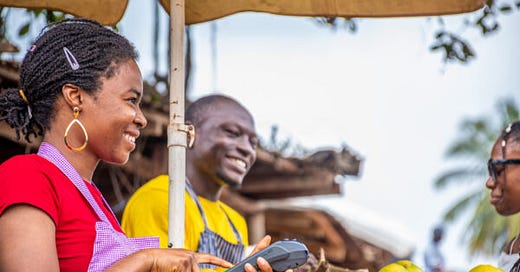Understanding the Critical Issues of Healthcare, Financial Inclusion, and Insurance in Africa
The challenges facing Africa's healthcare, financial inclusion, and insurance sectors, and the impact they have on shared prosperity.
Africa is a continent of incredible diversity and potential, but it also faces numerous challenges. Among the most pressing are inadequate healthcare, low levels of financial inclusion, and a lack of insurance coverage. These challenges have significant consequences for individuals, communities, and the continent, but there is also reason for hope. In this article, we will explore the current state of healthcare, financial inclusion, and insurance in Africa and highlight some of the initiatives and innovations that are helping to address these critical issues.
Healthcare: The Need for Quality Infrastructure
The quality of healthcare infrastructure in Africa is often inadequate, with limited access to healthcare facilities, equipment, and supplies. As a result, health outcomes are generally poorer than in other regions of the world. The COVID-19 pandemic has only highlighted these challenges, exposing weaknesses in healthcare systems and exacerbating existing inequalities.
To address these challenges, the African Development Bank (AfDB) has developed a strategy for quality health infrastructure in Africa from 2022 to 2030. The strategy aims to strengthen health systems and improve access to quality healthcare for all Africans. This includes investing in health infrastructure, expanding the healthcare workforce, and improving access to essential medicines and vaccines.
We must give hope to the poor and the vulnerable, by ensuring that every African, regardless of their income level, gets access to quality health care, as well as health insurance and social protection. Dr. Akinwumi A. Adesina, President, African Development Bank Group, 2021
The AfDB's strategy is just one example of the efforts to improve healthcare in Africa. Across the continent, numerous initiatives are aimed at improving access to healthcare services and strengthening healthcare systems. These efforts are critical to improving health outcomes and promoting shared prosperity across the continent.
Financial Inclusion: Unlocking the Potential of Africa's Economies
Low levels of financial inclusion remain a significant challenge in Africa, with many individuals and businesses excluded from the formal financial system. Limiting economic growth, hindering poverty reduction, and exacerbating inequality.
The rise of fintech in the continent has enabled new solutions to be developed that are helping to promote financial inclusion across the continent. Mobile money platforms, for example, have made it easier for individuals to access financial services, even in remote areas. In addition, partnerships between traditional financial institutions and fintech startups are driving innovation and expanding access to financial services.
Quick Stats.
According to the World Bank Findex survey, only about one-third of the adult population has ever made a digital payment, notwithstanding the full array of available electronic tools. Nigeria is also underperforming in mobile money ownership compared to more dynamic peer countries. The transaction intensity of mobile money accounts is also much lower than in early adopter countries (e.g., Kenya) or late proponents (e.g., Senegal)
Efforts to promote financial inclusion are essential for unlocking the potential of Africa's economies. By enabling more individuals and businesses to access financial services, we can support economic growth and promote shared prosperity across the continent.
Insurance for Shared Prosperity: Protecting Africa's Communities
Finally, insurance coverage remains low in Africa, with many individuals and businesses lacking access to essential insurance products. This limits their ability to protect themselves against risk, whether from health emergencies, natural disasters, or other challenges.
However, the emergence of innovative insurance products, such as microinsurance, is helping to expand access to essential coverage. These products are often tailored to the specific needs of individuals and communities, providing affordable coverage that can help protect against a range of risks.
Expanding access to insurance is critical for promoting shared prosperity in Africa. By enabling individuals and businesses to protect themselves against risk, we can support economic growth, reduce poverty, and encourage more resilient communities.
The curious case of African Lawmakers
Inadequate healthcare, low levels of financial inclusion, and a lack of insurance coverage remain significant challenges in Africa. Across the continent, innovative solutions are being developed that are helping to address these critical issues. From investing in health infrastructure to expanding access to financial services and insurance, there are numerous initiatives aimed at promoting shared prosperity in Africa. It is up to all of us to support these efforts and work towards a brighter future for the continent and its people.
Helpful resources
Nigeria—Fostering Financial Inclusion through Digital Financial Services
Current health expenditure (% of GDP) - Sub-Saharan Africa
Finance in Africa 2022: Navigating the financial landscape in turbulent times
Technology & Partnerships: A Driver for Insurance Inclusion in Africa
Capturing Africa’s insurance potential for shared prosperity
I’m hoping that you’ve enjoyed reading all the pieces from Africa Tech Memo. As 2023 gathers pace, we have a small favour to ask:
If you can, please support us on a monthly basis from just $2 (NGN920). It takes less than a minute to set up, and you can rest assured that you’re making a big impact every single month in support of us as we tend towards an open, independent journalism. Thank you.
For Partnerships, Adverts, and Sponsorships, send us an email - at giantaffairs@gmail.com OR call - 08074727030 | See Africa Tech Memo Ad Rate
For Support, use the link below:




